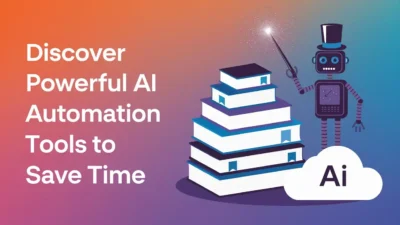Table of Contents
In today’s fast-paced educational landscape, artificial intelligence has revolutionized how students learn, research, and organize their studies. From automated writing assistants to personalized tutoring systems, AI study tools have become essential companions for learners across all levels of education. This comprehensive guide explores the most effective AI-powered study solutions available in 2025, helping you navigate the increasingly sophisticated world of educational technology.
The AI Revolution in Education
The integration of artificial intelligence into education has transformed traditional learning paradigms. No longer confined to simple flashcard apps or basic search functions, today’s AI study tools can analyze your learning patterns, customize educational content, and even simulate one-on-one tutoring experiences. Schools nationwide are increasingly incorporating these technologies into their curricula, recognizing their potential to address diverse learning needs.
The best AI study tools go beyond merely providing information—they adapt to individual learning styles, identify knowledge gaps, and create personalized study experiences that were unimaginable just a few years ago. As education continues to evolve, understanding and leveraging these sophisticated AI companions has become crucial for academic success.

Categorization of AI Study Tools
AI-Powered Writing and Editing Assistants
Writing assistants have evolved far beyond basic spell-checking, now offering comprehensive support for all aspects of written communication:
- Grammarly: Beyond grammar correction, it now provides style guidance, tone adjustments, and plagiarism detection specifically tailored for academic writing.
- QuillBot: This AI-powered paraphrasing tool helps students reframe complex concepts in their own words while maintaining academic integrity, offering seven different rewriting styles to match any writing requirement.
These writing tools have become indispensable for students preparing essays, research papers, and dissertations, helping them communicate their ideas more effectively while developing stronger writing skills.
AI-Powered Research and Literature Review Tools
Literature reviews and research have been revolutionized by specialized AI tools that can analyze thousands of academic papers in seconds:
- Consensus: This AI search engine specifically designed for scientific research can synthesize findings across multiple studies, identifying patterns and contradictions in scholarly literature.
- Elicit: Using natural language processing, this research assistant can answer specific questions by analyzing research papers, saving students countless hours of manual literature review.
- Litmaps: This visual research platform creates interactive maps of academic literature, helping students identify connections between papers and discover relevant research they might otherwise miss.
These tools have fundamentally changed how students approach research projects, allowing for deeper analysis and more comprehensive literature reviews.
AI-Powered Learning Platforms and Tutoring Systems
The most sophisticated AI study tools create personalized learning experiences that adapt to individual students:
- Khanmigo: Building on Khan Academy’s educational content, this AI tutor provides step-by-step guidance across multiple subjects, adjusting explanations based on student responses.
- Mindgrasp: This AI learning platform analyzes uploaded course materials and creates personalized study guides, practice questions, and explanations tailored to a student’s specific course.
- Google Gemini: Google’s advanced AI system offers interactive, conversational learning across multiple subjects, helping students work through complex problems while explaining underlying concepts.
- ChatGPT: OpenAI’s versatile language model serves as a virtual study partner capable of explaining concepts, creating practice problems, and offering guidance across virtually any academic subject.
These platforms represent perhaps the most transformative category of AI study tools, offering personalized tutoring at a fraction of the cost of human tutors.

These platforms represent perhaps the most transformative category of AI study tools, offering personalized tutoring at a fraction of the cost of human tutors.
AI-Powered Tools for Specific Subjects
Some of the best AI study tools specialize in particular subjects, offering deep expertise in their domains:
Mathematics Tools
| Tool | Key Features | Best For |
| Photomath | Step-by-step solutions via camera input | Visual learners solving equations |
| Mathway | Multi-method problem approaches | Understanding alternative solutions |
| Wolfram Alpha | Computational intelligence for advanced math | College-level mathematics |
| Julius AI | Conversational math tutoring | Students needing conceptual explanations |
| Mathos AI | Personalized math curriculum adaptation | Long-term skill development |
These specialized tools can often provide more in-depth support than general-purpose AI assistants, particularly for complex subjects like advanced mathematics.
AI-Powered Tools for Memorization and Study Organization
Effective studying requires not just understanding but also retention and organization:
- Quizlet: This platform now uses AI to analyze student performance and automatically generate personalized flashcards targeting knowledge gaps.
- Anki: While maintaining its spaced repetition foundation, Anki now incorporates AI-generated content and scheduling optimization.
- Notion: This versatile organization tool uses AI to automatically categorize and connect notes, creating a “second brain” for students.
- Mindgrasp: Beyond content explanation, it creates organized study materials from lectures and readings.
- Otter.ai: This AI transcription tool converts lectures into searchable, annotatable text, complete with automatically generated summaries and key points.
These organizational tools help students manage the ever-increasing volume of information they need to process throughout their academic careers.
Benefits of Using AI Study Tools
Personalized Learning Experience
The best AI study tools adapt to individual learning styles, paces, and preferences. Unlike traditional educational resources, these systems analyze performance patterns to identify strengths and weaknesses, then adjust content delivery accordingly. This personalization ensures students receive precisely the support they need when they need it.
Time Efficiency
AI tools dramatically reduce time spent on routine tasks like organizing notes, searching for relevant research, or checking citations. This efficiency allows students to focus on higher-order thinking and creative problem-solving rather than administrative tasks.
Enhanced Research Capabilities
AI research assistants can process and synthesize information from thousands of sources in seconds, uncovering connections and insights that might take humans weeks to discover. This capability enables students to conduct more comprehensive and nuanced research projects.
Improved Writing Skills
Rather than simply correcting errors, today’s AI writing assistants explain grammar rules, suggest style improvements, and help students develop their unique voice. This educational approach helps students become better writers, not just produce better documents.
Better Organization and Retention
AI-powered study organizers create optimal review schedules, identify connections between concepts, and transform scattered notes into coherent knowledge systems. These capabilities help students build more robust and accessible mental models of complex subjects.
Limitations and Ethical Considerations
Despite their benefits, AI study tools come with important limitations:
Accuracy Concerns
Even the best AI study tools occasionally make mistakes or present outdated information. Students must maintain critical thinking skills and verify important information, particularly for high-stakes academic work.
Over-Reliance Risks
Excessive dependence on AI tools can potentially undermine skill development. For instance, students who always use writing assistants may struggle when required to write without technological support.
Bias in AI Systems
AI systems can perpetuate existing biases in educational materials or present certain perspectives more prominently than others. Students should be aware of these potential limitations and seek diverse information sources.
Academic Integrity Challenges
Schools continue to grapple with defining appropriate AI use in academic settings. Students must understand their institution’s policies regarding AI assistance and maintain ethical standards in their work.
How to Choose the Right AI Study Tools
With hundreds of options available, selecting the right AI study tools requires careful consideration:
- Identify your specific learning needs: Different tools excel at different tasks. Assess whether you need help with content understanding, organization, writing, or another aspect of studying.
- Consider your learning style: Visual learners might benefit more from AI tools that create diagrams and visual explanations, while others might prefer text-based or conversational interfaces.
- Evaluate integration with existing workflows: The best AI study tool is one you’ll actually use consistently. Look for solutions that fit seamlessly into your current study habits.
- Test before committing: Most premium AI study tools offer free trials. Experiment with several options before investing time or money in a particular system.
- Check privacy policies: Educational AI tools often process sensitive personal data. Ensure the tools you choose have transparent and protective data practices.
Future Trends in AI for Studying
The educational AI landscape continues to evolve rapidly. Emerging trends include:
- Multimodal learning systems that can process and generate text, images, audio, and video simultaneously
- Collaborative AI tools designed for group projects and peer learning
- Emotion-aware systems that can detect frustration or confusion and adjust accordingly
- Integration with augmented and virtual reality for immersive learning experiences
As these technologies mature, the boundary between AI assistants and human tutors will likely continue to blur, creating even more powerful educational opportunities.
Conclusion
The best AI study tools in 2025 offer unprecedented opportunities to enhance learning across educational contexts. From specialized mathematics assistants to comprehensive research platforms, these technologies can dramatically improve how students engage with academic material. However, they remain tools rather than replacements for human intelligence and creativity.
When used thoughtfully—as supplements to critical thinking rather than substitutes for it—AI study tools can help students achieve deeper understanding, greater efficiency, and better academic outcomes. As education and technology continue their convergence, students who effectively leverage these AI companions will be best positioned for success in increasingly complex academic environments.
By understanding the capabilities, limitations, and appropriate applications of different AI study tools, students can build personalized learning ecosystems that amplify their natural abilities and help them overcome educational challenges. The future of education isn’t just artificial intelligence or human intelligence—it’s the powerful combination of both.
FAQ
What are the top AI study tools for college students?
Top AI study tools include Mathly for math, Grammarly for essays, and Unschooler for programming. ExamCram helps with studying, Kiwi is great for video learning, and TutorAI explores new topics.
How does AI enhance the learning experience for students?
AI in education offers a tailored approach to teaching. It caters to different learning needs, improving grades and retention. AI also makes learning fun with virtual tutors and interactive tools.
What are some of the innovative AI study tools available?
Innovative tools include AI writing assistants like Grammarly and all-in-one workspaces like Notion. Syntea is an AI teaching assistant that helps with studying.
How do AI-powered math tools assist students?
Mathly is a top AI tool for math, solving problems with photos and explanations. Photomath offers quick solutions with detailed explanations, supporting various math levels.
What are the benefits of using AI-powered writing and language learning tools?
Grammarly is a leading AI writing assistant, correcting grammar and style in real-time. GPTionary is a modern thesaurus, helping with foreign language expressions.
How do AI tools streamline the research process for students?
Perplexity AI is an advanced research assistant, providing accurate web information. Mendeley helps organize research papers, create citations, and collaborate on projects.
What are the personalized learning features of AI study platforms?
Unschooler offers personalized learning in tech, adapting content to user preferences. Syntea provides personalized study assistance, tailoring learning to individual needs.
How do AI tools support study organization and planning?
Notion is an all-in-one workspace for task management and planning. AI tools like ExamCram offer practice exams and study guides for exams.
What are the benefits of AI-powered virtual tutoring services?
Tutor.ai connects students with tutors for virtual sessions. Chat-GPT offers interactive conversations on various topics, aiding in study sessions.
What are the best practices for using AI study tools effectively?
Use AI tools as supplements, not replacements. Always verify AI information and balance AI help with independent learning to improve critical thinking.





